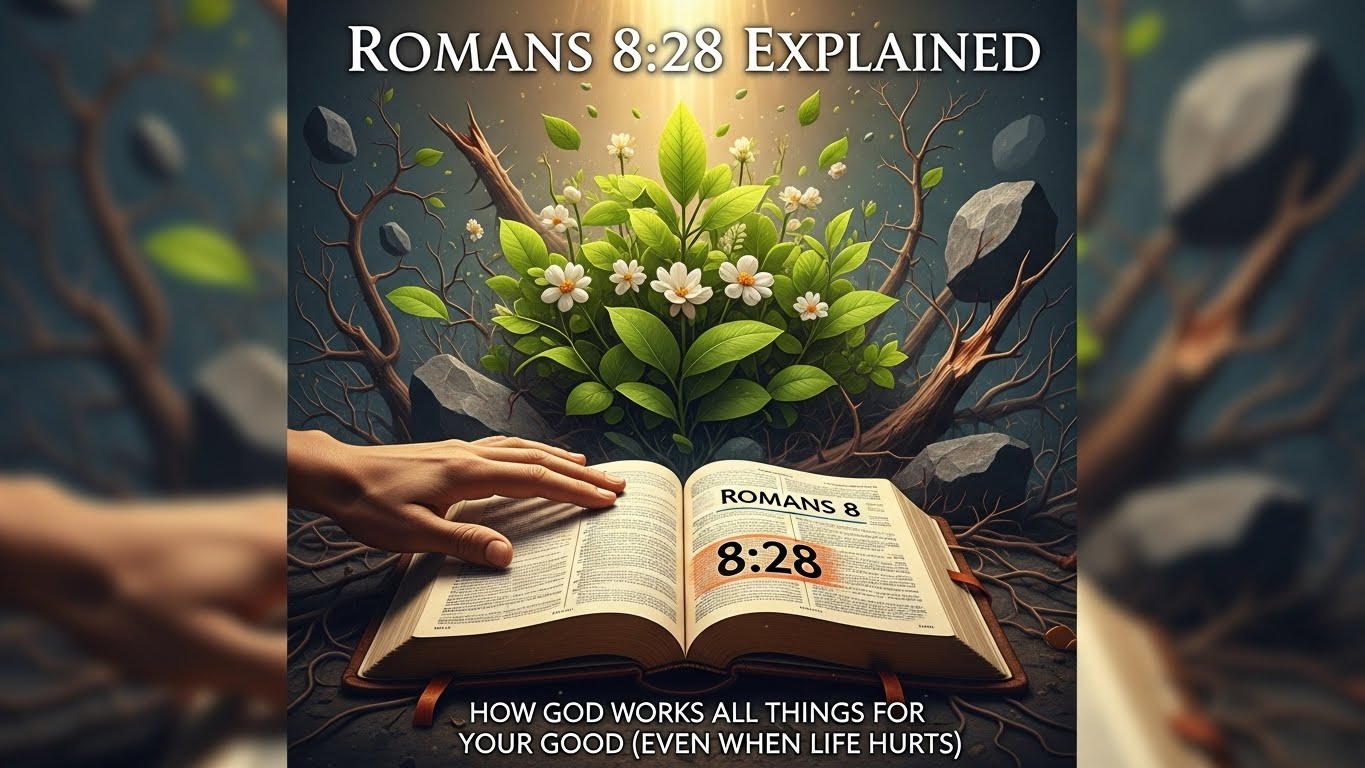(VOTD) Romans 8:28 Explained — How God Works All Things for Your Good (Even When Life Hurts)

Introduction — When Life Hurts, and Hope Feels Far Away
Every believer eventually reaches a moment that feels like a breaking point—where the prayers seem unanswered, the pain drags on longer than expected, and God’s presence feels quieter than ever. Maybe that moment is now. Maybe you’re walking through a diagnosis, a betrayal, a long season of financial pressure, or a dream that slipped through your fingers. And somewhere inside, you’ve wondered:
“If God is good, why is this so hard? And will anything good come from this?”
Those questions are not a sign of weak faith. They are the honest cries of a heart trying to reconcile real pain with real belief. And it’s in moments like these that Romans 8:28 becomes more than a familiar verse on a coffee mug. It becomes a lifeline—one of the most hope-filled promises in Scripture, but also one of the most misunderstood.
In this devotional, you’ll discover what Romans 8:28 truly means, how God defines “good,” and how to hold onto faith when life hurts deeply. This verse is not a shallow promise—it is a steady anchor for believers walking through real pain with real hope.
🔹 Simple Meaning in One Sentence
Romans 8:28 means that God is actively working through every circumstance—painful or joyful—to accomplish lasting good for those who love Him and live according to His purpose.
📖 Biblical Foundation of Romans 8:28
Romans 8:28 (NIV):
“And we know that in all things God works for the good of those who love him, who have been called according to his purpose.”
This verse doesn’t stand alone. The entire chapter of Romans 8 builds a foundation that leads up to this promise:
-
Verses 1–4: You are free from condemnation.
-
Verses 5–17: You are a child of God, led by His Spirit.
-
Verses 18–27: Suffering is real—but it points toward future glory, and the Spirit helps you in weakness.
Then Paul says, “And we know…”
Not “we hope,” “we wish,” or “we assume.”
We know—with certainty grounded in God’s character—that He is working in every detail for good.
👉 Jeremiah 29:11 Meaning — God’s Promise of Hope Explained
This promise echoes the hope found in Jeremiah 29:11, where God assures His people that His plans extend beyond present suffering.

🙏 What God Is Really Promising in Romans 8:28
The heart of Romans 8:28 is not that everything is good, but that everything can be used for good.
1. How God Uses Every Season Purposefully
Even when you can’t see it, feel it, or understand it.
Even when life feels unfair.
Even when others sin against you.
Even when the situation feels wasted.
God does not take breaks.
God does not forget you.
God does not overlook pain.
He is weaving, shaping, arranging, redirecting, and redeeming behind the scenes.
👉 Discover more about “Unwavering Hope in the Promises That Transcend Circumstances (Romans 8:28)” – A reflection on how hope anchored in God’s promises sustains believers even in the toughest seasons.
2. How God Redefines “Good” Through Pain
The good God produces is not always immediate relief. Instead, it often looks like:
-
Stronger faith
-
A softer, more compassionate heart
-
A deeper prayer life
-
Protection from unseen harm
-
A new direction aligned with His calling
-
Deliverance from something you didn’t know was dangerous
3. This promise is relational
Romans 8:28 is not a universal promise for everyone on earth. It is specifically for:
-
Those who love God
-
Those who walk in His purpose
This doesn’t mean perfect people. It means pursuit.
Imperfect love counts. Weak love counts.
Even tear-filled, trembling love counts.
God works with what you give Him—and multiplies it for your good.
🔍 Deeper Meaning Behind Romans 8:28

Romans 8:28 contains three transformational truths that become clearer when you reflect on the original Greek language.
1. “In all things.”
This covers the full spectrum of human experience:
-
The things you chose
-
The things you didn’t choose
-
The things others did to you
-
The things that felt like complete failures
-
The things you thought ruined your life
Nothing is exempt.
Nothing is beyond the reach of redemption.
👉 Learn how hope is anchored in God’s promises beyond Romans 8:28 in “Hope: Anchored In God’s Promises – Romans 15:13; Hebrews 6:19”
2. “Works”
This word gives us the English term “synergy.”
It means to work together—not separately.
God doesn’t use just one event for good.
He uses all of them together—your past, your present, your relationships, your skills, your pain, your mistakes, your victories, and even your detours.
Think of a master weaver—every thread matters, even the dark colors. Without them, the design would lack depth.
3. “For the good.”
This good is moral, spiritual, eternal, and character-forming—not just circumstantial comfort.
The goal is not to make you happier temporarily but holier eternally.
Not more comfortable, but more complete.
Not more in control, but more surrendered.
This is why Joseph could say:
“You intended to harm me, but God intended it for good.” (Genesis 50:20)
👉 Isaiah 41:10 Meaning — Do Not Fear, God Is With You
A Real-Life Illustration — When God Writes a Better Story Than We Can See
Imagine a believer named Mara.
Mara spent years praying for a stable job. After working hard, she finally landed a position that felt perfect. But within eight months, the company downsized, and Mara was let go. It felt like a cruel twist—a promising chapter cut short.
But behind the scenes, God was already working.
During her weeks of unemployment, Mara:
-
rekindled her prayer life
-
slowed down enough to notice signs of burnout
-
joined a Bible group that transformed her faith
-
discovered a new passion for counseling hurting women
-
eventually found a new career path supporting abuse survivors
Had she stayed in the old job, she would’ve missed the ministry God had prepared for her.
That’s Romans 8:28 in action.
Not immediate comfort—but purposeful transformation.
Stories like this reflect how God’s comfort often becomes visible only in hindsight.
Modern Connection — How This Ancient Promise Speaks to Today’s Pressures
We live in a world that expects instant answers, instant fixes, and instant clarity. But spiritual growth rarely happens instantly. Romans 8:28 gives you permission to:
1. Stop trying to control every detail
You don’t have to be your own savior.
You don’t have to predict the future.
You don’t have to fix everything yourself.
2. Release guilt over past mistakes
God doesn’t just work with your victories—
He works with your failures, too.
Your brokenness is not useless.
Your regret is not wasted.
Your scars are not shameful—
They are raw material for redemption.
3. Live with more hope and less fear
Hope is not wishful thinking.
Hope is confidence in God’s character.
4. Treat others with more patience
When you believe God is working in you,
you also believe He is working on them.
5. Develop resilience
You learn to survive storms not by avoiding them,
but by trusting the One who sails with you.
Practical Application — How to Live Out Romans 8:28 Daily

You don’t need a perfect plan. You just need small, steady steps.
1. Practice “pause prayers.”
Before reacting during stress, whisper:
“Lord, work in this. Show me what I can’t see.”
2. Journal “evidence of God’s fingerprints.”
Write down small blessings, unexpected conversations, doors that opened, lessons learned, moments of comfort.
These are not coincidences—
They are signatures of God’s activity.
3. Look for the growth, not just the outcome
Ask:
-
How is this shaping my character?
-
What is God teaching me to release?
-
What is He strengthening in me?
4. Walk with a community of faith
Hope grows stronger when shared.
Isolation magnifies pain; community redistributes it.
5. Rehearse truth when feelings fluctuate
Feelings change.
God’s promises don’t.
Read Romans 8 often—it recalibrates your perspective.
Faith Reflection Box — Slow Down and Listen
Pause. Breathe deeply.
Ask yourself:
-
Where have I seen God turn something painful into something life-giving?
-
What situation right now seems hopeless?
-
How might God be working in ways I cannot yet perceive?
-
What fear do I need to surrender for God to work fully in me?
God is already working.
Your task is to trust what your eyes cannot see yet.
Extended Key Takeaways
-
God doesn’t waste anything—not pain, not waiting, not mistakes.
-
His work is continuous, even when silent.
-
The “good” is often internal before it becomes external.
-
Trust is built daily, not instantly.
-
Your suffering may one day become someone else’s survival guide.
-
God writes long stories; don’t judge the chapter you’re in.
Q&A — Digging Deeper
Q1: Does Romans 8:28 guarantee that everything will turn out the way I want?
No. It guarantees something far better: that God will bring good from everything—even the things that did not go your way.
Q2: How can I trust God when I can’t see any purpose in my suffering?
Start with small trust steps: honest prayer, remembering past faithfulness, and letting community help you see what you can’t.
👉 Consider reading: Why Does God Allow Suffering? — Romans 8:28
Q3: If I’m struggling with doubt, does this promise still apply to me?
Yes. Doubt doesn’t disqualify you. Faith is not the absence of questions—it’s trusting God in the midst of them.
Reflection Questions (Expanded)
-
What part of my life feels the most “unredeemable” right now?
-
What might God be forming in me through this season?
-
Which biblical stories illustrate how God transforms pain into purpose?
-
How has God redeemed something in my past that once seemed hopeless?
-
What step of trust can I take today—big or small?
Practical Takeaway
This week, choose one situation that feels discouraging and declare Romans 8:28 over it daily.
Write down any small evidence of God’s movement.
You’ll begin to see hope rising.
📚 Continue Your Study
👉 Isaiah 41:10 Meaning
👉 Jeremiah 29:11 Meaning
👉 Prayers for Strength During Hard Times
Short Prayer
Father, thank You that nothing in my life is wasted in Your hands. When I cannot see Your purpose, help me trust Your heart. When I feel weak, strengthen me. When my hope fades, renew it. Work in every detail of my life according to Your perfect will. Shape me, steady me, and lead me until Your good becomes clear. In Jesus’ name, Amen.












